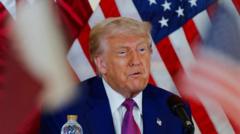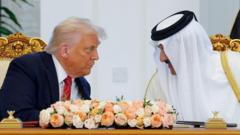President Donald Trump has expressed a strong desire to strike a deal with Iran concerning its nuclear ambitions, a move that could create tension among more conservative factions within his own party. During his recent diplomatic visit to Saudi Arabia, he stated, “If I can make a deal with Iran, I’ll be very happy,” emphasizing a preference for diplomacy over military intervention. This stance marks a notable change from earlier strategies that sought to isolate Iran following its 2015 agreement to limit its nuclear activities.
Trump Pushes for Iran Nuclear Deal Amidst Gulf State Pressure

Trump Pushes for Iran Nuclear Deal Amidst Gulf State Pressure
In a significant shift, President Trump seeks to negotiate with Iran over its nuclear program, although his terms may not satisfy conservative hardliners.
As Trump toured various Arab states, leaders urged him to pursue a negotiated settlement, since the alternative—a nuclear Iran or military conflict—could bring dire repercussions for the Middle East. Ali Vaez from the International Crisis Group has warned of the dangerous implications of either scenario. However, Trump's willingness to consider a deal may clash with demands from over 200 Republican lawmakers advocating for a hardline approach that requires Iran to completely dismantle its nuclear program.
The United States remains wary of a nuclear-armed Iran, fearing it could trigger an arms race and increase regional instability. Trump's negotiations, should they materialize, will serve as a test for his ability to manage dissent within his party while navigating a complex geopolitical landscape.
The United States remains wary of a nuclear-armed Iran, fearing it could trigger an arms race and increase regional instability. Trump's negotiations, should they materialize, will serve as a test for his ability to manage dissent within his party while navigating a complex geopolitical landscape.






















